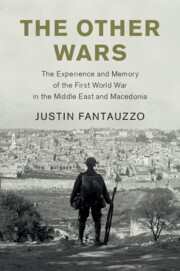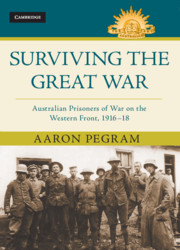Refine search
Actions for selected content:
15418 results in Military history
Part II - Memory
-
- Book:
- The Other Wars
- Published online:
- 28 November 2019
- Print publication:
- 12 December 2019, pp 165-225
-
- Chapter
- Export citation
Figures
-
- Book:
- The Other Wars
- Published online:
- 28 November 2019
- Print publication:
- 12 December 2019, pp vi-vi
-
- Chapter
- Export citation
Introduction
-
- Book:
- The Other Wars
- Published online:
- 28 November 2019
- Print publication:
- 12 December 2019, pp 1-14
-
- Chapter
- Export citation
Bibliography
-
- Book:
- The Other Wars
- Published online:
- 28 November 2019
- Print publication:
- 12 December 2019, pp 226-243
-
- Chapter
- Export citation
Index
-
- Book:
- The Other Wars
- Published online:
- 28 November 2019
- Print publication:
- 12 December 2019, pp 244-248
-
- Chapter
- Export citation
2 - Touring
- from Part I - Experience
-
- Book:
- The Other Wars
- Published online:
- 28 November 2019
- Print publication:
- 12 December 2019, pp 50-92
-
- Chapter
- Export citation
6 - Private Memory
- from Part II - Memory
-
- Book:
- The Other Wars
- Published online:
- 28 November 2019
- Print publication:
- 12 December 2019, pp 205-219
-
- Chapter
- Export citation
Copyright page
-
- Book:
- The Other Wars
- Published online:
- 28 November 2019
- Print publication:
- 12 December 2019, pp iv-iv
-
- Chapter
- Export citation
1 - Soldiering
- from Part I - Experience
-
- Book:
- The Other Wars
- Published online:
- 28 November 2019
- Print publication:
- 12 December 2019, pp 17-49
-
- Chapter
- Export citation
Acknowledgements
-
- Book:
- The Other Wars
- Published online:
- 28 November 2019
- Print publication:
- 12 December 2019, pp vii-x
-
- Chapter
- Export citation
Part I - Experience
-
- Book:
- The Other Wars
- Published online:
- 28 November 2019
- Print publication:
- 12 December 2019, pp 15-164
-
- Chapter
- Export citation
5 - Public Memory
- from Part II - Memory
-
- Book:
- The Other Wars
- Published online:
- 28 November 2019
- Print publication:
- 12 December 2019, pp 167-204
-
- Chapter
-
- You have access
- HTML
- Export citation
3 - Meaning
- from Part I - Experience
-
- Book:
- The Other Wars
- Published online:
- 28 November 2019
- Print publication:
- 12 December 2019, pp 93-138
-
- Chapter
- Export citation
4 - Forgotten
- from Part I - Experience
-
- Book:
- The Other Wars
- Published online:
- 28 November 2019
- Print publication:
- 12 December 2019, pp 139-164
-
- Chapter
- Export citation

The Other Wars
- The Experience and Memory of the First World War in the Middle East and Macedonia
-
- Published online:
- 28 November 2019
- Print publication:
- 12 December 2019

Surviving the Great War
- Australian Prisoners of War on the Western Front 1916–18
-
- Published online:
- 12 November 2019
- Print publication:
- 12 November 2019
Copyright page
-
- Book:
- Surviving the Great War
- Published online:
- 12 November 2019
- Print publication:
- 12 November 2019, pp iv-iv
-
- Chapter
- Export citation
Bibliography
-
- Book:
- Surviving the Great War
- Published online:
- 12 November 2019
- Print publication:
- 12 November 2019, pp 240-255
-
- Chapter
- Export citation
Glossary
-
- Book:
- Surviving the Great War
- Published online:
- 12 November 2019
- Print publication:
- 12 November 2019, pp xiv-xv
-
- Chapter
- Export citation
Appendices
-
- Book:
- Surviving the Great War
- Published online:
- 12 November 2019
- Print publication:
- 12 November 2019, pp 178-211
-
- Chapter
- Export citation
